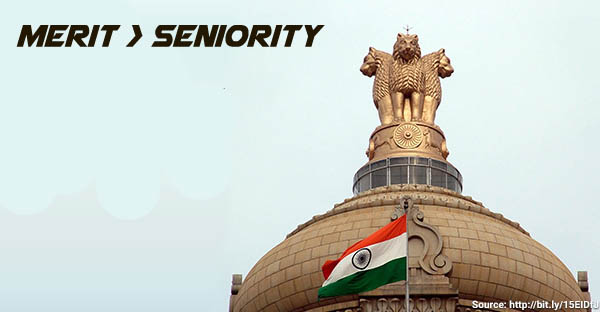When the architects of the Indian Constitution were busy framing the constitution, they were continuously plagued by the issue of “checks-and-balances”…for you see, a democracy exists on four pillars. While the three pillars, as we all know, comprises of the executive, the legislative, and the judiciary; the “fourth estate” aka the fourth pillar is made up of the media, which needs to be strong (both morally as well as in terms of its independence).

Thus, the Indian Constitution envisioned a democratic fabric, where each of these pillars were made to check and balance the other pillars; thereby never bestowing absolute power in the hands of one to the detriment of the others, which would ultimately create imbalances leading to the end of a robust democracy.
Of course, as interpreters of the Constitution, the judiciary has always assumed a certain disdain for the other pillars, which is what we are witnessing when it comes to the tussle between the government and the judiciary. While the Centre and the Apex Court have been locking horns on the issue of the appointment of judges for a long time (even amidst the appointment of Justice JS Khehar as the 44th Chief Justice of India, who is due to take charge on January 3, 2017), the citizens are left wondering as to who is the ultimate loser in this tug-of-war. Well, to be honest…it is the common citizen walking the hallways of these “once-hallowed-now-hollow” temples of justice…who is going to bear the brunt of these decisions.
Of course, without making the issue moralistic, let us simply concentrate on one issue for now, which needs to be highlighted in this age-long battle between the government and the judiciary — the Case in point…Merit vs. Seniority (pun, surprisingly, wasn’t intended). While the government wants the criteria of seniority, merit and integrity to form the basis for the elevation of a High Court Judge to the Supreme Court, the judiciary is championing the criteria of seniority — subject to merit and integrity, of course.
The thing that troubles me is not just the appointment of judges and the criteria of ‘seniority’ taking centre-stage…my problem is with the whole Indian obsession with ‘age’ and ‘experience’…which mind you is no measure of ‘merit’, ‘performance’, ‘efficiency’, or even ‘effectiveness’. It is this strange mindset that is unique to this country…that troubles me overall.
The dangerous aspect is the assumption it propagates! Which is why, we assume that a professor with grey hair would teach our sons and daughters better than a young faculty who is only blessed with a few grey strands of hair. [Note: Then again, in the world of academia, that is not a blessing, it’s a curse!] Similarly, in the case of appointment of judges, we are assuming that sheer age would be enough to dispense justice to one-and-all.
What we are forgetting in the process, is why ‘merit’ not only takes a backseat but is forced to play second fiddle at all times?!? What is the problem in appointing a meritorious judge? Why are we so “AGEIST”… [Note: I mean, look at our Parliament and the “ageing” politicians sitting inside them…] … and it is this issue that we all need to seriously think about…if we want a world where knowledge and merit will trump the colour of one’s hair and the wrinkles on one’s face. Wouldn’t you want such a world?!?































